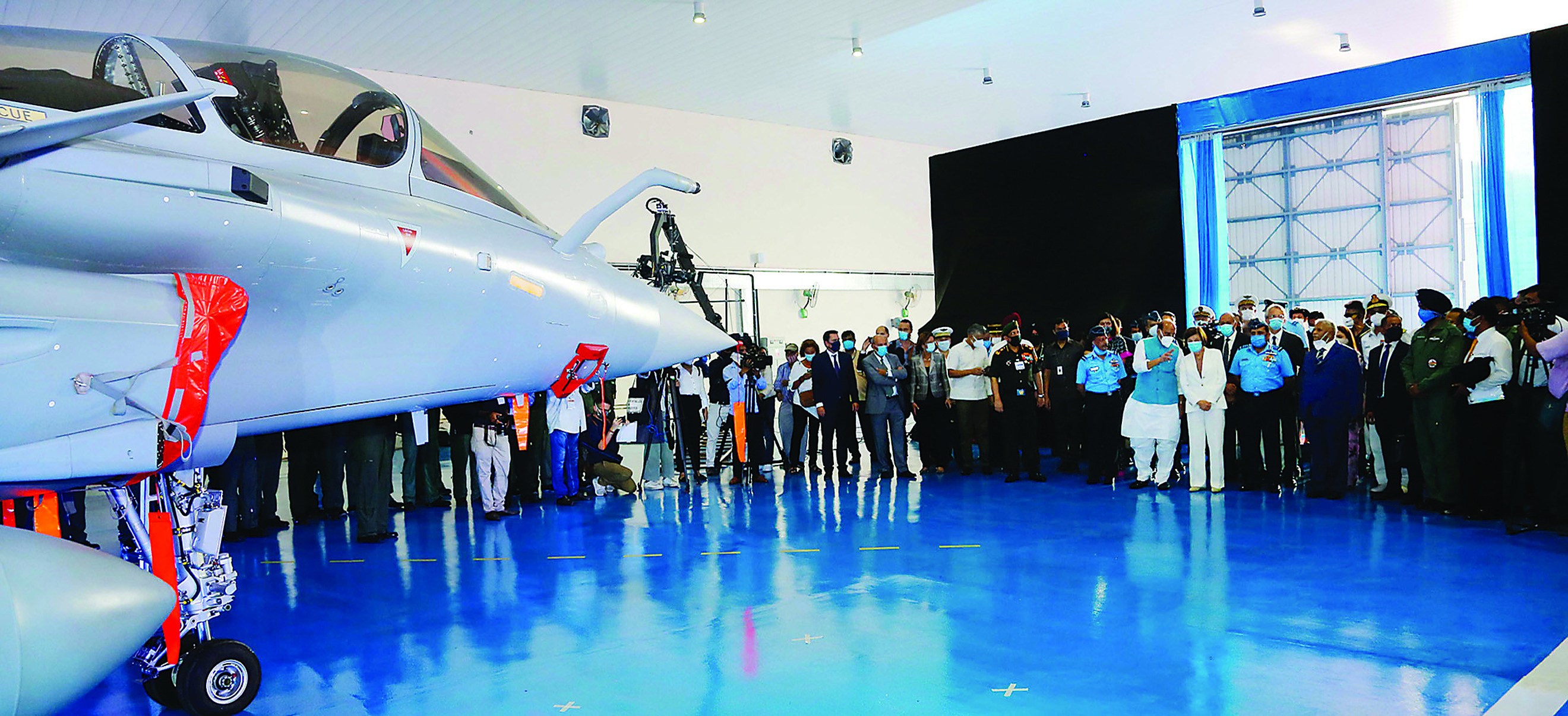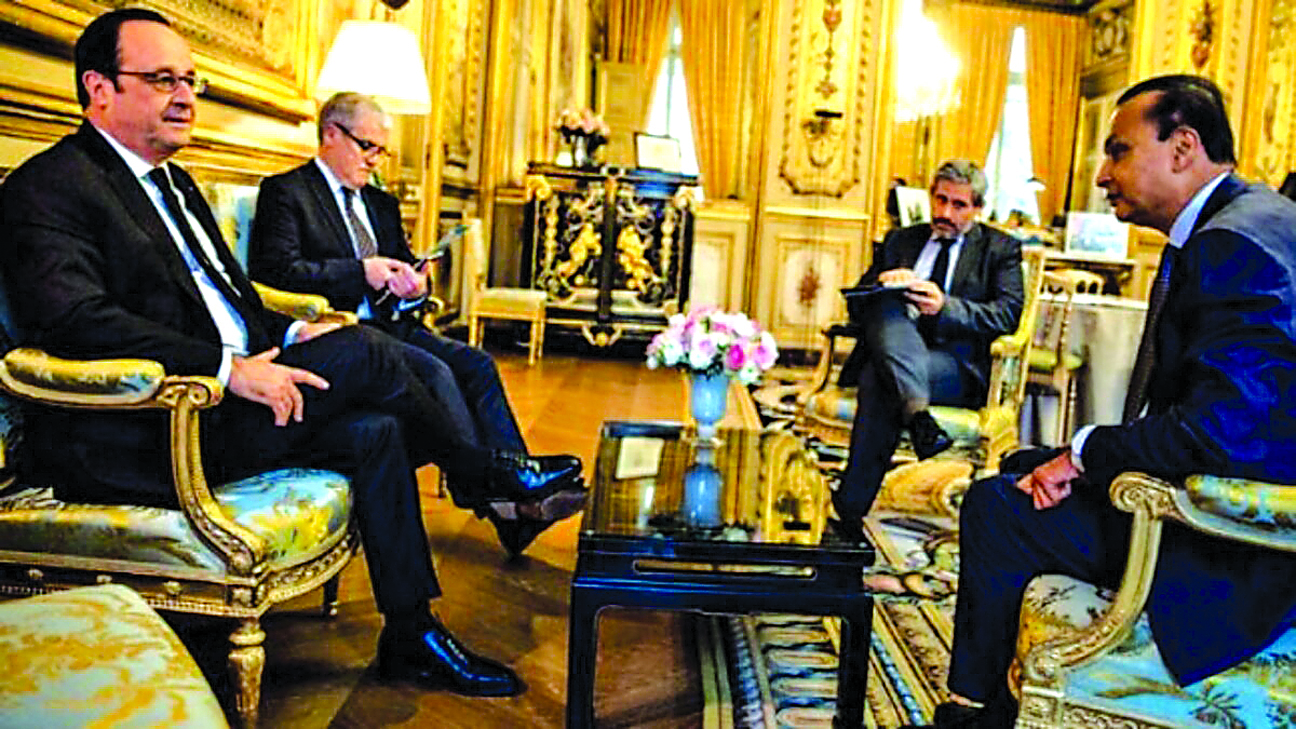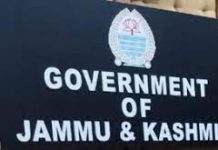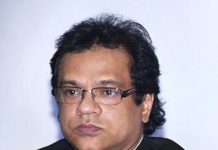While France’s leadership faces judicial probe into Rafale contract graft charges, the defence deal reignites fire in India politics, report MUDIT MATHUR AND GOPAL MISRA

The Chief of Defence Staff (CDS), General Bipin Rawat, the Chief of the Air Staff, Air Chief Marshal R.K.S. Bhadauria and the Defence Secretary, Dr. Ajay Kumar are also seen.
French President Emmanuel Macron, along with former president Francois Hollande, and his government is facing a judicial probe into charges of suspected corruption and favouritism in France over the controversial 7.8-billion-euro sale to India in 2016 of 36 Dassault-built Rafale fighter aircraft. In the latest of a series of investigative exposés exhibiting how Dassault provided a remarkably generous financial gift to its local industrial partner Reliance Group, owned by Anil Ambani, a member of big corporate industrialist’s family close to Prime Minister Narendra Modi. Almost a buried chapter in India could dominate once again with its far-reaching political ramifications in the nation during upcoming session of the parliament.
A French judge has been appointed to lead a highly sensitive judicial investigation into charges of suspected “corruption” and “favouritism” over the 7.8-billion-euro sale to India of 36 Dassault Aviation Rafale fighter aircraft into inter-governmental deal signed off in 2016. The Investigating judge would examine other elements including questions surrounding the actions of former French president Francois Hollande, who was in office when the Rafale deal was inked, and current French president Emmanuel Macron, who was at the time Hollande’s economy and finance minister, as well as the then Defence minister, now foreign affairs minister, Jean-Yves Le Drian.
The decision to clear the smoke over the deal came in wake of uninterrupted investigative stories by senior French journalist Yann Philippin into “Rafale Papers” in the French website Mediapart, exposing the secret dealings behind the contract which appeared in April 2021. The issue was taken up for judicial investigations by the French anti-corruption NGO Sherpa through a complaint with the tribunal of Paris, citing “corruption”, “influence peddling”, “money laundering”, “favouritism” and undue tax wavering surrounding the deal.
“On October 26, 2018, the Sherpa (NGO) lodged a simple complaint in order to bring to the attention of the national financial prosecutor about the facts and suspicions surrounding the sale of the Rafale planes to India. Sherpa suggested that the facts emerged, “should have justified the opening of an investigation.” Its first complaint aimed in particular “the troubled circumstances surrounding the negotiations and the signing of a Franco-Indian agreement on the production and sale by Dassault Aviation of 36 Rafale for an amount of 7.8 billion euros,” explained master French lawyer William Bourdon, founder of the anti-corruption NGO Sherpa and Vincent Brenghart who represented Sherpa.
But in 2019 the former head of the National Financial Prosecutor’s Office (PNF), Eliane Houlette, dismissed its initial complaint, against the advice of one of her staff and without carrying out any investigations, justifying her decision as “to preserve the interests of France,” said the lawyer for the Sherpa, Master Vincent Brengarth in an interview to francetvinfo. “But two years later, her successor as head of the PNF, Jean-François Bohnert, has decided to support the opening of a probe, after the complaint of Sherpa was updated with latest developing details from Media part’s recent series of investigations,” said Brengarth, adding “It is imperative that a judge can investigate, can deepen, can launch acts of investigations.”
“This contract is surrounded by extremely suspect conditions, since Dassault had won a call for tenders in 2012 which was initially intended for 126 Rafale aircraft and finally, from 126, we went to 36, the unit cost of which was tripled. And in a completely abnormal way, even though at the outset in the framework of the negotiations a partner who was used to this type of contract, who was a reputable aircraft manufacturer, was selected, we are going to come and conclude this contract which covers nearly seven billion euros, with a partner who has no real experience in the field, but for which, on the other hand, we know that there is a proximity between its management and the Indian Prime Minister,” complainant emphasised.
“There are also other things which are a little more technical but which relate in particular to the fact that in certain contracts, corruption clauses have been deleted. We also have clues that have also been revealed in recent months of retrocession and payment of kickbacks,” Mr Brengarth remarked.

The matter further turned murky when in March 2019 the Indian agency, Enforcement Directorate, arrested one Sushen Gupta in a money laundering case relating to defence purchase of helicopters from Italian-British group Agusta-Westland for having hidden commission of 50 million euros from the group allegedly paid out as bribes to Indian officials. Sushen Gupta’s arrest and the revelations in the Indian press did not escape the notice of the Agency Française Anti-corruption (AFA). By 2020, when it came to finalise its report of its Dassault audit, the AFA had hard information incriminating Dassault with the proof that the aeronautical company had paid an Indian middleman, — and one who had since been accused in a separate case, — via a one-million-euro deal for model aircrafts that may not even exist.
In India the same issue was raised before, the Supreme Court, but the petition was dismissed after intervention of Attorney General informing in a sealed envelope containing unsigned note that the Comptroller and Auditor General of India (CAG) has already examined the deal and found nothing wrong in it.
The inclusion of Anil Ambani, who is credited with a number of “defunct” corporate as the Indian partner for setting up facilities in India, has triggered off the allegations in India. In this purchase, 50 per cent of the cost of the aircrafts has to be invested in Indian facilities under an off-set mechanism. Earlier, in such purchases, the Hindustan Aeronautics Limited (HAL), a public sector undertaking, used to the main agency for the off-setting. Amidst the allegations of the “deliberate hike” in the price of the aircrafts, the deal became controversial. It is expected to become a mega issue during the forthcoming monsoon session of Parliament in mid-July.
During the past four years, the controversy has triggered off following the cancellations of the ongoing negotiations about this purchase, which presumably was an effort to end “any possible role” of a middleman. The deal was renegotiated and was signed between the two governments, India and France. It will be huge embarrassment to the Modi government, if in the investigations Macron and Hollande are indicted.
In the contemporary France, the practice of sending the “corrupt” to the gallows or to be guillotined, a common practice during the French Revolution years, might have be abandoned, but if these two top French politicians found guilty, they could face imprisonment up to 10 years accompanied by huge fines. These stricter punishments have become a part of the law following the recent amendments in the anti-corruption laws. There are 35 offences, including influence-peddling or bribing a foreign official, which attract stricter punishments under the 2016 law on transparency, corruption and modernization of the economy.
The earlier resistance of the “powerful business and political lobbies” against any investigation appears to have ended. There could have been delays due to the Covid-19 pandemic, but the offices and courts have now resumed normal functioning. Interestingly, this “relatively lull” period, the Foreign Corruption Practices Act (FCPA) has been made much more stringent.
The issue has been kept alive in the public domain due to a French website, Mediapart, which has been regularly disclosing the corruption cases in various business deals in France. It also suspects that Anil Ambani might already have had entered into an agreement with French aircraft manufacturer, Dassault, two weeks before the Indian Prime Minister Narendra Modi cancels the Rafale deal. In a bid to eliminate any middleman, Modi had decided to discontinue the ongoing final negotiations, which were going on following the floating of a global tender for the purchase of the aircrafts and were in a final stage. Instead, a new agreement between the governments of the countries was signed.
The website has also claimed the role of a middleman whose disclosures India’s Enforcement Directorate is reportedly aware of but has not bothered to investigate so far. India’s major media houses, which had mostly kept silence about this deal, are now extensively giving coverage to the deal. In fact, the issue which had received much attention of a number of social media sites could have forced the major newspapers and media channels to report the issue.
The purchases of the aircrafts could just have been a business deal, but the issue received attention, when the Narendra Modi-led BJP government ascended in the office and the ongoing negotiations were stalled and decided to ink the government-to-government deal. The logic that it would eliminate middleman could not sustain following the induction of Anil Ambani. Ambani having little experience in any defence production floats a corporate and the French company engages his company as an oddest partner.
It is getting increasingly difficult for the Modi government to claim distance from the Indian tycoon. In spite of keeping the deal under wraps, the issue may again come up before the Indian Supreme Court; the allegation that the Attorney General had lied before the apex court that the financial aspect of the deal has already been scrutinized by the CAG may also be examined. India’s key investigating agency, CBI, which was called a “government’s parrot” might become more assertive in coming months, and the government will be facing “political heat” for setting up of a Joint Parliamentary Committee (JPC).
ACHILLES’ HEEL
There are other dimensions in this deal such as “justifying” the massive increase in the prices of the aircraft negotiated earlier, the removal of the technology transfer clause and indeed in the selection of an Indian partner, Anil Ambani. With the mention of Anil Ambani in this deal, it is difficult to sustain or accept the government’s logic that the government-to-government deal was arrived at to end any possible role of a middle man. There may be demand for a thorough probe in the price increase, which is being claimed as an extra price for getting each aircraft fitted with much lethal weapons system. It might also be questioned whether the decision to have an Indian partner really depended upon the French manufacturer. The Indian argument, however, is silent on the issue of technology transfer and why the role of the Hindustan Aeronautics Limited (HAL) has been eliminated.
With the revival of this issue in France, it is yet to be seen how the government responses to this huge embarrassment. The issue was quietly buried by the PNF, though a NGO, Sherpa, had filed a complaint in 2019. However, according to French media reports, the country’s anti-corruption agency investigated the allegation that the company, Dassault Aviation, which had paid one million Euros to an Indian middleman. The French company, however, has denied that “No violations were reported in the frame of the contract. The issue is now under a judicial probe following the request of France’s national financial prosecutors’ office.
The issue came up in a few Indian news sites, but Anil Ambani rebutted the allegations; and even filed defamation cases against the Indian media houses demanding huge compensations for maligning him and his companies. It is yet to be seen how the government will be able to justify its logic that it is up to Dassault to choose its partner. Earlier, the then Defence Minister Nirmala Sitharaman, now finance minister, had stated, “Let me make it very clear, no offset contracts have been signed so far. If two private firms come together, that doesn’t require permission from the ministry. And if it is consistent with the DIPP’s [Department of Industrial Policy & Promotion’s] policy, they go ahead with it. To think that that has something to do with the inter-governmental agreement in the purchase of Rafale is just unfounded.”
In spite of this statement, the foundation stone of the Dassault Reliance Aviation Limited’s manufacturing facility in Nagpur has already been laid in the presence of the union minister NItin Gadkari and the then Maharashtra chief minister Devendra Fadnavis. The Reliance is having 51 per cent share, while the French company has invested more than 90 per cent in the venture.
The 7.8-billion-euro (US$ 9.3-billion) deal for 36 planes between the Indian government and French aircraft manufacturer Dassault is now under the scrutiny in France. The probe in this deal may also begin in India amidst the reports that “millions of Euros of hidden commissions” were given to a go-between who helped Dassault conclude the sale, of which “some… could have been given as bribes” to Indian officials. In spite of Dassault’s denials, the judicial probe on this deal. In the Sherpa’s first complaint that “Dassault chose Reliance Group as its Indian partner, a conglomerate headed by billionaire Anil Ambani, who is close to Prime Minister Narendra Modi.”
CONGRESS DEMANDS JPC PROBE
BOTH RAHUL and other senior Congress Party leaders have renewed the demand to constitute a JPC to probe the allegations. They assert that the issue may not be able to be cleared during a court hearing.
“If France can probe the role of its former president, its former defence minister and perhaps its current president in facilitating the controversial deal, why shouldn’t India come clean on the matter?”, it is being pointed out. The Congress Party has stressed that “It is a matter of national security and dignity. It is not a contest between the Congress and BJP. It is natural that the Union government will be asked critical questions.”
The Mediapart probe into the defence deal shows that The new deal, in which Dassault had to supply 36 ready-to-fly aircraft to India in partnership with Anil Ambani’s Reliance group, was worth 60,000 crore. It replaced the earlier concluded deal in which Dassault had to supply 126 Rafale fighter jets to India, out of which 108 were to be manufactured by the HAL. According to various estimates, the new agreement was three times more expensive than the previous deal.
GIFTS TO CLIENTS
The suspicion was confirmed, when the Agence Française Anticorruption (AFA)combed through the 2017 accounts its investigators came across an item of expenditure costing 508,925 Euros and entered under the heading “gifts to clients”. The AFA is answerable to the French government and was set up in 2017 with the aim of checking whether large companies have implemented the anti-corruption procedures set out in the French law — as part of a scheduled audit of the Dassault Group.

OPPOSITION CHARGES
THE ORDER of judicial investigations by PNF France has given fresh strength to suspicions of corruption charges raised by former Congress President Rahul Gandhi against the ruling ‘Modi government’ on this issue. Rahul Gandhi appeared to be encouraged that his hard work will not go in vain in the Rafale case. Substantial facts are coming in public domain, triggering moral pressure before the present central government to come clean and explain what compelled the prime minister to alter the terms of global tender and how the number of fighter aircraft has gone from 126 to 36 with unimageable cost escalation?
Former Defence Minister AK Antony stated that Prime Minister Narendra Modi went to Paris on April 10, 2015. He unilaterally announced the purchase of 36 Rafale aircraft without going through any tender process and in complete violation of the ‘Defence Procurement Procedure’. Expressing shock over the attempts to bury the Rafale scam, “the Narendra Modi government will not be able to escape accountability now,” Antony outrageously remarked during media interaction.
Congress leader Pawan Khera said, if Rahul Gandhi decides to do something, he is completely behind it till some results come out. None other leader of opposition except Rahul Gandhi continued raising his voice on Rafale.
The main opposition, congress party had built up its 2019 Lok Sabha elections campaign against the Modi government on the issue of corruption in the Rafale defence deal. But ahead of the elections, a bench headed by Chief Justice of the Supreme Court Ranjan Gogoi had dismissed all the review petitions filed in the Rafale case that defused the heat of the congress party campaign. His post retirement engagement as a nominated Rajya Sabha member gave occasion to independent thinkers and jurists to question his impartiality for his overall judicial behaviour.
The Congress leader Rahul Gandhi’s concerted attack on Prime Minister Narendra Modi’s Rafale deal, is focussed on the issue of unilaterally altering a 2015 arrangement to buy 36 French fighter jets for a price, the Opposition claims, three times inflated, and further he points out the involvement of Reliance. He alleged that not only India overpaying for the Rafale aircraft, it is fetching paybacks to an inexperienced corporate giant Anil Ambani who is a new entrant in the field of defence production of aircrafts.
Calling it the “biggest ever” corruption scandal, Gandhi said that the terms of the Rafale deal — originally negotiated by the Congress-run United Progressive Alliance — had been changed by Modi to benefit “his friend” Anil Ambani. “The fun part is that the contract was given to Anil Ambani, who has never made an aeroplane in his life nor has he ever taken a contract for defence,” he stated.
Senior Congress leader Digvijaya Singh also challenged Prime Minister Narendra Modi to announce for a Joint Parliamentary Committee (JPC) to probe the much controversial Rafale fighter jet deal, following the similar scrutinization procedure carried out when allegations of corruption surfaced in the Bofors deal in the 1980s.
“France has started a probe in the Rafale case, but in India, where commission was paid, no inquiry is being conducted. If one compares the Rafale deal with the Bofors case, the then prime minister Rajiv Gandhi had, on his own, constituted a JPC,” Singh said.
“If Modi has courage, he should constitute a JPC. We have a lot of questions and will get opportunity to raise them,” the Congress leader added. Nobody could prove a single charge against Rajiv Gandhi in the Bofors case, he said.
INDO- FRANCO TIES STAY WARM
INDIA-FRANCE became strategic allies quietly without much media discussion. It had existed even during the reign of Maharaja Ranjit Singh in the western India.
The Fauj-i-Khas was the elite wing of his army. It was strictly trained under french pattern and had a separate emblem and flag. It consisted of four infantry battalions, two cavalry regiments and one artillery troop. Its weapons and equipment (including clothing) were of the best kind. Two French commanders, General Jean-Baptiste Ventura and Jean-Francois Allard were engaged to develop the army on the French pattern. The two commanders had served in the army of Napoleon. Five years later, in 1827 an American defence expert, Colonel Alexander Gardner, was engaged to modernise the artillery. It, perhaps of the reason that the then Governor General, Lord Auckland, decided to befriend the Sikh rulers than to help Afghanistan to regain Peshawar (now in Pakistan).
ANIL AMBANI’S ROLE
Sherpa’s logic that Anil Ambani’s outfit the Reliance had financed a film co-produced by Julie Gayet, the partner of Francois Hollande, who was president at the time. Therefore, this could constitute “influence peddling”. Therefore, Anil Ambani’s induction, who has little experience in the defence production, being an Indian partner amounts to “favouritism”. Also, his company replaced the Indian Government’s company, HAL, which had past experience with the French company. It initially had been negotiations with the HAL for finalizing the supply of the 126 aircraft in 2012. However, during Indian Prime Minister Narendra Modi’s official visit to France, the previous negotiations were halted. It was decided to have a government-to-government agreement.
JUSTICE GOGOI REFUSES TO COMMENT ON PROBE
JUSTICE RANJAN GOGOI, now Rajya Sabha MP and formerly Chief Justice of India who had headed a Supreme Court bench that declined to order a probe into the Rafale deal, said on Sunday that he had no comments to make on the French probe. “I have nothing to say on the issue. I have no comments to make,” Justice Gogoi.
Just before the general elections of the Parliament, on December 14, 2018, the bench of Justices Gogoi, Sanjay Kishan Kaul and K.M. Joseph had dismissed a PIL for a CBI probe into the purchase of 36 Rafale fighter planes. On November 14, 2019, the bench dismissed a review petition on the issue. However, Justice Joseph had said in a separate opinion in the review verdict that the judicial decision did not bar the CBI from registering an FIR on a complaint, provided prior approval was obtained in line with the Prevention of Corruption Act that covers public servants.
“Rafale: Ranjan Gogoi refuses to comment on French probe. The MP& formerly CJI had headed a SC bench that declined to order an investigation into the same. He dismissed our petition on the basis of an unsigned govt note in a sealed cover and took a seat in RS!” tweeted eminent lawyer Prashant Bhushan who was amongst the first to move to the Supreme Court seeking investigation into the matter. However, the Apex Court had dismissed the allegations contending that there was no firm ground for the FIR. “The Mediapart story further corroborates the whole string of evidence which we had placed before the Supreme Court seeking an independent investigation into the deal.” He further said that it was unfortunate that then CJI Ranjan Gogoi preferred to accept what the government told them blindly. After that, he mentioned that the former Chief Justice was offered a Rajya Sabha seat.
A 70-YEAR-OLD RELATIONSHIP
EARLIER, 1953 onwards the Dassault Aviation had supplied India 100-odd M.D. 450 Ouragan (Hurricane) fighter-bombers-nicknamed Toofani by the IAF in 1953. The Mystere IVAs were obtained a few years later, which had given excellent performance during the India-Pakistan war of 1965.
Again, India could produce two helicopters, Chetak (Aerospatiale Alouette III) and Cheetah (Aerospatiale SA-315B Lama), which were deployed by the IAF. They are still deployed in Himalayan regions, like the 17,000 feet high Siachen Glacier and surrounding areas. Both these helicopters also perform assorted training, transport, casualty evacuation, communications and liaison roles and limited interdiction tasks.
The Indian and French air forces and navies have also been conducting joint exercises since 2018. Both sides also decided to hold an annual dialogue between the two defence ministers to further enhance strategic and military ties, and concluded the Joint Strategic Vision of India-France Co-operation in the Indian Ocean Region.
India’s French connection had been further augmented in seventies, when India obtained Jaguar aircraft jointly built by the Britain and France. Since the French are much ahead of Britain in aviation technologies, French help was sought in maintaining and upgrading her aging fleet of the fighters, India had been seeking French help in upgrading as well as to meet spare parts of the planes such as Sukhois, MiG-29M’s and the French Mirage 2000H, retrofitted to Mirage 2000-5 standards, all of which fall into the third or fourth generation categories. The much-trumpeted indigenously developed Tejas Light Combat Aircraft (LCA) too received France’s technological support. At present, the IAF is operating only 28 squadrons against its sanctioned strength of 42. In 2018, the ageing fleet of Jaguars numbering around 118 aircrafts, France gifted 31 Jaguar airframes to keep the 40-year-old planes airworthy.
WHAT IS THE RAFALE DEAL?
THE INDIAN Air Force has been seeking a new twin-engine fighter jet for some time, to replace the ageing Russian fighters that are being phased out. After testing out a number of global options, the Air Force in 2012 put the Rafale, built by France’s Dassault, and the Eurofighter Typhoon on its final list. The Congress-led United Progressive Alliance government had put out a tender for 126 fighter jets and, because of a lower bid offer, had planned to buy 18 Rafales in fly-away condition from Dassault, with the remaining to be built in India along with the state-owned Hindustan Aeronautics Limited. In 2015, however, on a visit to France, Modi announced a completely new deal, in which India would be getting 36 Rafale jets from France, all in fly-away condition. Under the terms of this 59,000 crore deal, all the planes would-be built-in France, but Dassault would have to offset about 50 per cent of that cost in India.
Offset clauses are conditions placed on suppliers that force them to spend a portion of their contract cost in a certain way. In this case, Dassault has to ensure that the 59,000 crore that India will be paying it for the Rafale aircraft ends up being invested in the Indian defence system. This means that Dassault will have to inject about 30,000 crore into India as part of this deal.
THE PROBITY NGO: SHERPA
THE SHERPA, founded in 2001 by civil society in France with a mission to protect and defend victims of economic crimes drawing on the power of the law and to fight against the new forms of impunity linked to globalization. The vision is to help build a world where law is in service of a more mindful globalization.
Economic criminality covers two main forms materializing in two programs at Sherpa: the Globalization and Human Rights Programme and the Illicit Financial Flows Programme. To implement them, Sherpa brings together an expert team of lawyers, using legal tools, strategies and advocacy, along with pro bono representation from committed international jurists, lawyers, and specialists
Our groundbreaking work has resulted in legal remedies being delivered to victims of corporate-related human rights abuse, changes in law and policy that have helped reshape global business as well as defence of civil society actors and their work from corporate reprisal.
LEADERS TWEET
CONGRESS GENERAL Secretary and incharge of UP affairs Priyanka Gandhi Vadra tweeted, “Three things cannot be long hidden: the sun, the moon, and the truth. —Lord Buddha.
CPM leader Sitaram Yechury said, “The French public prosecution services (PNF) has ordered an investigation by a French judge into the 2016 Rafale fighter jets purchase deal entered into by the Modi govt. PM Modi’s turnaround was mired in deep corruption & money laundering suspicion. Constitute a JPC Now.”
Bahujan Samaj Party (BSP) supremo Mayawati “The news of a judicial inquiry set up by the French government on allegations of alleged corruption in the purchase of Rafale fighter jets by the Government of India has made headlines again and again, this matter has come up in public discussions. It would be better if the central government also takes proper cognizance of it.”
“Though it is not a new to hear allegations and counter allegations of commission in defence deals and its investigation but it is an old burning chapter since the time of the Congress government, but BSP believes it would be justified if the present government of the Center finally settle the Rafale dispute in accordance with public satisfaction,” she added.

YANN PHILIPPIN: THE INVESTIGATIVE JOURNALIST
THE SENIOR journalist of French website Mediapart, Yann Philippin is a distinguished graduate of the IEP of Grenoble and of the Journalists’ Training Center (CFJ) of Paris. He joined journalism in 2000 as an economic journalist, first specializing in technologies, then companies. Before Mediapart, he worked for the magazine Futur(e)s, as an independent, at the Reuters agency, at the Journal du Dimanche, then at Liberation, at the economy services then investigation. He covered many sectors of the French economy (aeronautics, automotive, health, industry, transport) and investigated economic affairs (Airbus, crash of the Rio Paris flight of Air France, Mediator, SNCF accident in Brétigny, Belgian fortune of Bernard Arnault, Qatar-Veolia affair.) then politico-financial (Tapie, Dassault). He co-authored the book Dassault System (Robert Laffont), with his colleague from France Inter Sara Ghibaudo.
Philippin joined Mediapart in the investigation services in March 2015. Specialized in financial affairs, tax fraud and corruption and worked in particular on “leaks”, these massive data leaks which fuelled the Football Leaks or Malta Files investigations, published by Mediapart with its partners from the European Investigative Collaborations (EIC) network.
LETTERS@TEHELKA.COM












